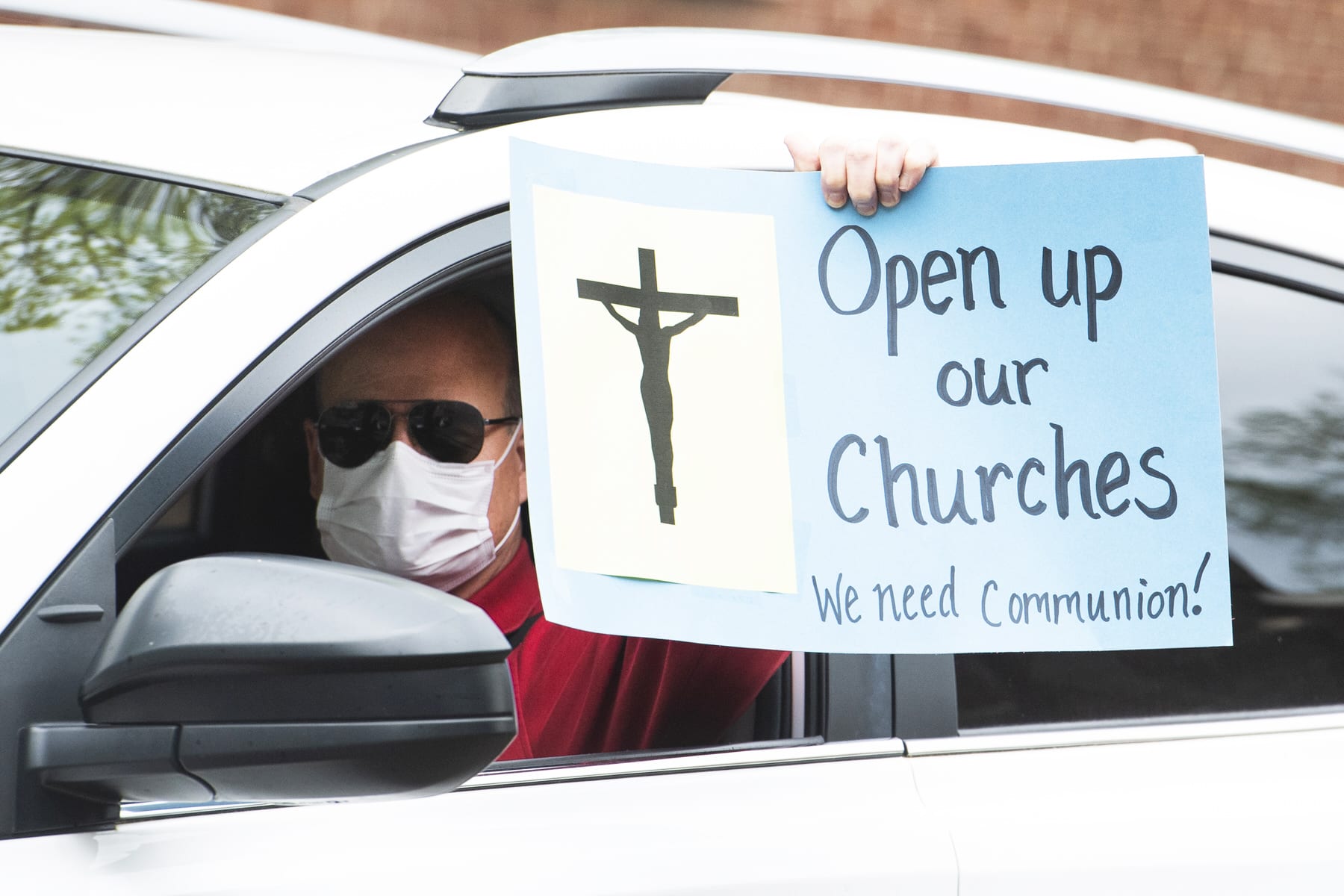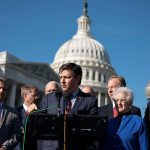At first, advocates wondered if it wasn’t a mistake. South Dakota’s Senate Bill 124 aimed to give churches leeway to operate during the pandemic, but it contained four lines that, in advocates’ generous reading, were vague, too broad, or perhaps just poorly written. In another interpretation, those same lines were a revival of language used to discriminate against LGBTQ+ people.
If passed, SB 124 would allow churches to hold indoor services despite COVID-19 restrictions. The bill states that the government would not be able to “substantially burden a person’s exercise of religion” without “compelling government interest.”
That language echoed the Religious Freedom and Restoration Act, also known as RFRA, a federal law passed 27 years ago. The law, once intended to protect minority religions and Indigenous people, has since been copied by state legislatures and used to discriminate against LGBTQ+ people and people trying to access reproductive health care, advocates said.
“I don’t believe in accidents during legislative session,” said Vivian Topping, director of advocacy and civic engagement at the Equality Federation, a coalition of state-level LGBTQ+ rights organizations. “There’s always someone behind something somewhere.”
The 19th found at least 36 RFRA-type bills have been filed in state legislatures since January, 25 of them tucked into bills intended to allow churches to operate during the pandemic.
The spate of RFRA bills seems to underscore a larger trend: Topping has counted at least 184 anti-LGBTQ+ measures filed in state legislatures this year. That tally, however, does not entirely reflect all of the RFRAs woven into COVID church bills.
“This session is one of the worst that I’ve seen,” Topping said. “We’re seeing [anti-LGBTQ+] bills moving faster than we expected them to, we’re seeing them pop-up more.”
RFRA measures were not always controversial. The federal RFRA passed in 1993 after two Indigenous people were fired for using peyote, something they said was part of their religious practice. Mainstream religious organizations backed the law, as did the ACLU, noted Rose Saxe, deputy director of the LGBT & HIV Project for the organization.
“Minority faiths would be less likely to have their religion respected by laws that were sort of generally applicable,” Saxe said.
But after the Supreme Court used the law to rule in 2014 that Hobby Lobby could deny its employees contraception coverage, the law’s place in courts and culture shifted dramatically. Progressives who once viewed it as a vehicle from shielding people of minority faiths began to see it as a weapon that could be used to justify discrimination against LGBTQ+ people, women and other protected groups under the guise of religious liberty.
The federal RFRA was employed in the defense of a Harris Family Funeral Homes after the business fired Aimee Stephens because she revealed she was transitioning genders. Stephens’ case would become the landmark Supreme Court Case over federal employment protections that helped grant LGBTQ+ workers nondiscrimination protections last year.
Since 1993, states have passed their own versions of the law, with varying degrees of strictness. Today, 21 states have their own versions of RFRA. The last state to pass RFRA into law was Indiana under then-Gov. Mike Pence in 2015.
Since then, RFRAs, like other anti-LGBTQ+ bills and bills that limit access to reproductive health have been introduced. Most, however, have languished in legislatures: Lawmakers have grown increasingly cautious about the anti-LGBTQ bills they promote. In 2016, North Carolina found itself facing an estimated loss of $3.76 billion after passing an anti-transgender bathroom bill that resulted in nationwide boycotts. Since then, lawmakers in other states have repeatedly shied from sending through overtly anti-LGBTQ+ bills.
But state legislatures have also grown more conservative, Saxe said. And anti-LGBTQ+ organizations have deepened their connections to conservative lawmakers. Last year, as the pandemic shuttered statehouses, Idaho pushed two anti-trans bills into laws, which courts later blocked. This year, LGBTQ+ advocates have been particularly alarmed by a floor of anti-transgender bills that aim to bar kids from playing school sports or access medical care that major medical associations agree is necessary.
While concerning to some advocates, RFRAs simply have moved at a rapid clip under the radar.
Montana has a full-fledged RFRA that cleared the Senate Judiciary Committee February 12. In Arkansas, senators are seeking a constitutional amendment RFRA, a process that requires approval from both houses and voters. That route is highly unusual said Alison Gill, the vice president for legal and policy with American Atheists.
“I’m really concerned about these bills moving forward,” Gill said. “I think there’s just not much understanding that these might actually endanger people.”
Advocates say that South Dakota’s bill is the clearest example of a legislation ostensibly aimed at addressing a wider issue while also putting in place exemptions that would allow for discrimination.
“The key operative language, which is that first paragraph about the ‘compelling government interest’ and not ‘substantially burdening extra exercise of religion,’ that really tracks the federal RFRA,” said Sarah Warbelow, legal director at the Human Rights Campaign.
The bill was introduced by Republican Sen. Lee Schoenbeck. While he wasn’t known for being LGBTQ+ friendly, as Senate pro tem he did not, as expected, reassign a string of anti-trans bills to committees where they would sail through. LGBTQ+ advocates had relied on his devotion to procedure, and thought that if he wasn’t an ally, at least he wasn’t a foe.
Schoenbeck did not respond to multiple requests from The 19th to comment.
Multiple LGBTQ+ legal experts have hinted that Alliance Defending Freedom (ADF), an anti-LGBTQ+ legal group, may have a hand in the RFRAs hitting legislatures this year.
Matt Sharp, senior counsel for ADF, testified in favor of Montana’s RFRA. Sharp said that his organization has been involved with the bills, which he said “ensure that freedom gets a fair hearing.” He did not say directly if his organization was responsible for producing the or advocating for the measures behind-the-scenes.
“As is typical practice for legal organizations, Alliance Defending Freedom is often asked by legislators to review possible legislation and offer advice,” he said in a statement to The 19th. “Montana’s legislature is simply building upon the model laid out in the federal RFRA, a bill that was passed before ADF even existed as an organization.”
LGBTQ+ advocates still have concerns, however. Many note that states with bills like South Dakota’s aren’t even preventing churches from holding indoor services right now. And states that have strong nondiscrimination protections like California have a version of the bill.
While legal experts have speculated that other anti-LGBTQ+ measures will be cast aside by courts because of last year’s landmark LGBTQ+ Supreme Court ruling, RFRA bills are more likely to hold up in court. That’s because they fall under a different area of the law, and there’s already precedent for them.
“The potential for misuse of these kinds of laws, and the clear intent, by their proponents to allow them to be used to justify discrimination and harm to others, is really concerning,” Saxe said. “I think there’s a lot at risk.”
Additional reporting by Alexa Mikhail.
Bills and resolutions with RFRAs in state legislatures:
- Arkansas: HJR 1024
- Arkansas: SJR 124
- Arkansas: HB 1211
- Arizona: HB 2648
- Arizona: HB 2575
- California: SB 397
- California: SB 448
- Indiana: SB 0263
- Kentucky: SB 250
- Kentucky: HB 479
- Kentucky: HB 298
- Kentucky: HB 201
- Kentucky: HB 524
- Kentucky: HB 218
- Missouri: HB 602
- Montana: SB 172
- Montana: SB 215
- Nebraska: LB 167
- New Hampshire: HB 440
- New Hampshire: HB 5442
- New Jersey: NJA 376
- North Dakota: HB 1410
- North Dakota: SB 2181
- Oklahoma: SB 368
- Oklahoma: HB 1887
- Oklahoma: SB 216
- Oklahoma: SB 678
- Oklahoma: SB 235
- Oklahoma: HB 2648
- South Carolina: H3105
- South Dakota: SB 124
- South Dakota: HB 1093
- Virginia: SB 1261
- Virginia: HB 2112
- Washington: HB 1029
- West Virginia: HB 2545






